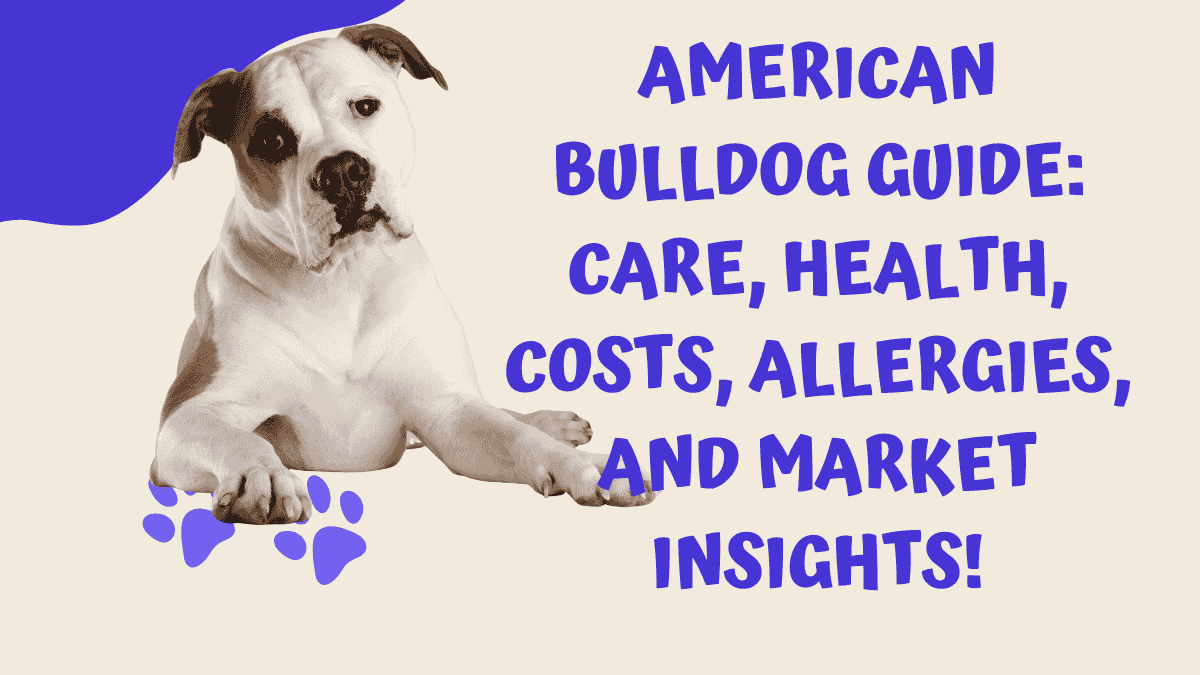Meet the American Bulldog: A Loyal and Versatile Breed
The American Bulldog, a muscular and loyal breed, traces its roots to 17th-century England, arriving in the United States in the 1800s as a utility farm dog adept at catching feral animals. Revived post-World War II by breeders like John D. Johnson and Alan Scott, the breed is known for its strength, courage, and affectionate temperament. Standing 20–28 inches tall and weighing 60–120 pounds, American Bulldogs come in two types: the muscular Johnson (Bully) and the agile Scott (Standard). Their short, white-based coat with brindle, black, or brown markings requires minimal grooming but specific skin care. According to the American Bulldog Association, their versatility as guardians, hunters, and family companions has sustained their popularity since the 1980s.
Caring for Your American Bulldog
American Bulldogs are energetic, intelligent, and loyal, requiring dedicated training, ample exercise, and a committed owner. Best suited for active households with space, they thrive with 1–2 hours of daily exercise, such as walks, tug-of-war, or agility courses. Their protective nature and strong prey drive necessitate early socialization to ensure compatibility with children and other pets. They are less suited for small apartments due to their size and energy levels.
Exercise and Socialization
Daily exercise of 1–2 hours, including walks, runs, or interactive games, is essential to prevent boredom-induced behaviors like chewing or barking. Socialization through exposure to new people, animals, and environments from puppyhood helps temper their wariness of strangers and reduces territorial tendencies. Obedience classes ($50–$200) are recommended to harness their intelligence and eagerness to please.
Health Considerations for American Bulldogs
With a lifespan of 10–12 years, American Bulldogs are generally healthy but prone to specific conditions. Responsible breeders screen for genetic issues like hip dysplasia and ichthyosis to ensure healthier puppies. Regular veterinary check-ups ($500–$700 annually) are vital for early detection and management.
Hip and Elbow Dysplasia
These hereditary conditions cause joint misalignment, leading to pain, limping, or arthritis. Mild cases may be managed with weight control, medication, or physical therapy, while severe cases require surgery ($1,500–$4,000 per joint). Responsible breeders screen parent dogs to minimize risk.
Allergies
American Bulldogs are susceptible to skin and food allergies due to an overactive immune system, often presenting as itching, redness, fur loss, or recurring ear infections. Veterinary testing identifies allergens, with treatments including hypoallergenic shampoos (e.g., medicated shampoos costing $10–$30), antihistamines, or prescription diets ($60–$100/month). Annual allergy management costs range from $100–$500, with severe cases requiring ongoing care.
Ichthyosis
A rare genetic skin condition, ichthyosis causes flaky, itchy skin due to improper skin development. Mild cases need frequent bathing with medicated shampoos, while severe cases require daily bathing and oiling. Costs for medicated products range from $100–$300 annually. Breeders should test for this condition.
Other Health Concerns
American Bulldogs may face cherry eye (surgical correction: $500–$1,500), hypothyroidism ($20–$50/month for medication), neuronal ceroid lipofuscinosis (NCL, no treatment), and cranial cruciate ligament tears ($1,000–$3,000 for surgery). Pet insurance ($30–$70/month) can offset costs for these conditions.
Feeding Your American Bulldog
American Bulldogs require high-protein, AAFCO-compliant dog food formulated for large breeds (e.g., Hill’s, Royal Canin). Puppies need 2–3 cups daily across three to four meals, reducing to 2–3 cups across two meals for adults. Slow-feeders or puzzle toys prevent rapid eating and promote mental stimulation. Monthly food costs range from $40–$80, totaling $480–$960 annually.
Portion Control and Costs
Portion sizes depend on age, weight, and activity level. Overfeeding risks obesity, exacerbating joint issues. Veterinary guidance ensures tailored feeding plans, especially for allergies. Treats should not exceed 10% of calorie intake to maintain nutritional balance.
Nutritional Supplements
AAFCO-compliant diets are complete, but supplements may include:
- Fish oil or omega-3s for skin and allergy relief.
- Glucosamine for joint health, reducing dysplasia risks.
- Probiotics for digestion, particularly with allergies.
Veterinary approval is required before adding supplements.
Behavior and Training Tips
American Bulldogs are outgoing, loyal, and protective, with a playful, sometimes clownish demeanor. Their strong prey drive and territorial instincts require supervision around small animals and strangers. Early socialization ensures they are gentle with children and compatible with other pets when raised together.
Temperament and Family Life
With proper training, American Bulldogs are excellent family dogs, affectionate with children but potentially boisterous for toddlers due to their size. They thrive in active households and may not suit low-energy owners or small living spaces.
Training Strategies
Their intelligence and eagerness to please make them responsive to positive reinforcement training with treats and praise. Consistent, patient sessions prevent boredom, and early socialization (before six months) builds confidence. Obedience classes ($50–$200) and activities like agility enhance their mental and physical stimulation.
Grooming Your American Bulldog
American Bulldogs have a short, low-shedding coat, making them low-maintenance but not hypoallergenic due to dander. Their wrinkles and skin require diligent care to prevent infections, especially for allergy-prone dogs.
Coat and Skin Care
Brush weekly with a bristle brush to remove loose hair and maintain coat health. Bathe as needed with dog-friendly shampoo ($30–$60 per session for professional grooming). Clean wrinkles daily with a damp cloth to prevent bacterial buildup, particularly for dogs with allergies or ichthyosis. Annual grooming costs are $200–$600.
Eye and Ear Care
Use an eye-cleaning solution to minimize tear stains, common in white-coated dogs. Clean ears weekly with a vet-approved cleanser to prevent wax buildup and infections, which may indicate allergies. Veterinary consultation is needed for persistent issues.
Breed Cost and Considerations for Buying
Purchasing an American Bulldog from a reputable breeder costs $800–$3,000, averaging $1,800–$2,000, with prices varying by region (Northeast: $1,200–$2,000; Southeast: $1,000–$1,800; Midwest: $1,000–$1,800; West: $1,200–$2,500) and factors like pedigree, coat color, and health certifications. Show-quality or champion-bloodline puppies may reach $4,000–$10,000. Adoption through shelters or rescues, such as American Bulldog Rescue, costs $100–$500, covering vaccinations and spay/neuter. In 2024, the AKC reported moderate registration numbers (exact figures unavailable), indicating steady demand. Initial setup costs (crate, bed, toys) are $200–$400, with first-year vaccinations at $100–$200. Annual care, including food, grooming, and vet visits, ranges from $1,200–$2,500, with lifetime costs of $20,000–$35,000 over 10–12 years. Pet insurance ($30–$70/month) is recommended for unexpected medical expenses.
Care Tips for Buying
When buying an American Bulldog, consider:
- Choose breeders who provide health clearances for hip dysplasia, elbow dysplasia, ichthyosis, and other genetic conditions to ensure puppy health.
- Ensure you can provide 1–2 hours of daily exercise and mental stimulation. American Bulldogs suit active owners but may challenge first-time owners due to their strength and energy.
- A spacious home with a secure, fenced yard is ideal due to their size and activity needs. Small apartments are less suitable.
- Budget for grooming ($200–$600/year), allergy treatments ($100–$500/year), and potential surgeries (e.g., dysplasia, cherry eye). Pet insurance mitigates costs.
- Enroll in obedience classes ($50–$200) and socialize early to manage their protective instincts and ensure compatibility with children or pets.
Trends and Influence on the Pet Care Market
Date of Analysis: September 4, 2025
Context: Steady Breed Demand, No Specific Event
The American Bulldog maintains steady demand in 2025, with breeder prices ranging from $800–$3,000 (averaging $1,800–$2,000) and elite kennels charging $4,000–$10,000 for champion-bloodline puppies. Adoption fees ($100–$500) support rescues like American Bulldog Rescue, reflecting a growing adoption trend. The breed’s health challenges, particularly allergies and ichthyosis, drive demand for specialized pet care products, such as medicated shampoos and prescription diets ($60–$100/month). Their active nature fuels sales of high-protein foods and training tools, while their historical roles as farm dogs and guardians sustain interest in working dog programs.
Influence: The American Bulldog’s low-shedding coat and wrinkle care needs contribute to the $5 billion pet grooming industry, with demand for hypoallergenic shampoos and professional grooming ($30–$60/session). Allergy treatments, including antihistamines and veterinary diagnostics, bolster the pet pharmaceutical market. Joint issues like hip dysplasia drive veterinary services, with surgeries costing up to $4,000, increasing pet insurance adoption ($30–$70/month). The 2025 dog treats market, projected at $44.2 billion, sees growth from premium, protein-rich treats tailored for active breeds like the American Bulldog. Their versatility in agility and therapy work supports niche markets for training equipment and programs.
Answers to Common Questions
Are American Bulldogs Good Family Dogs?
Yes, with early socialization and training, they are loyal and affectionate with children, though their size may be too boisterous for toddlers. Supervision is recommended.
How Much Does an American Bulldog Cost?
Puppies cost $800–$3,000 (average $1,800–$2,000), with show-quality puppies up to $10,000. Adoption costs $100–$500. Annual care is $1,200–$2,500, with lifetime costs of $20,000–$35,000.
Are American Bulldogs Hypoallergenic?
No, their short coat sheds moderately, and dander can trigger allergies. Weekly brushing and wrinkle care reduce allergens, but test exposure before buying.
Do American Bulldogs Shed?
They shed minimally, with weekly brushing controlling loose hair. Their coat is low-maintenance but requires wrinkle cleaning to prevent infections.
How Are American Bulldogs with Other Pets?
Their strong prey drive may lead to chasing small animals. Early socialization ensures better compatibility with other dogs or cats, with supervision needed.
Moving Forward: Ensuring Your American Bulldog Thrives
American Bulldogs bring strength, loyalty, and playfulness to active households. By prioritizing consistent training, regular grooming, proper nutrition, and proactive health care, you can ensure your Bulldog leads a healthy, vibrant life. Partner with reputable breeders or rescues, consult your veterinarian, and embrace their energetic nature for a rewarding companionship.

